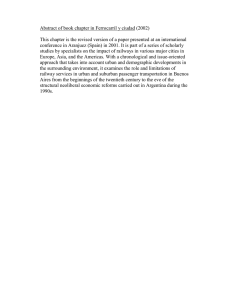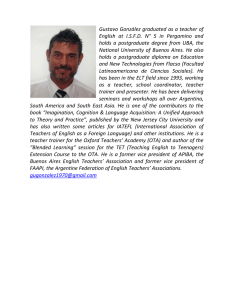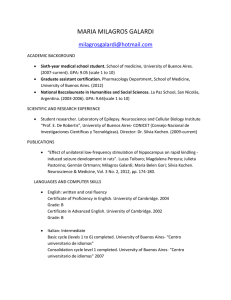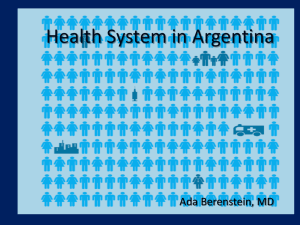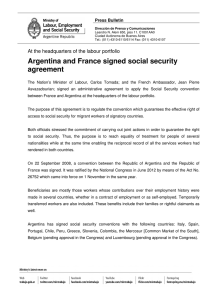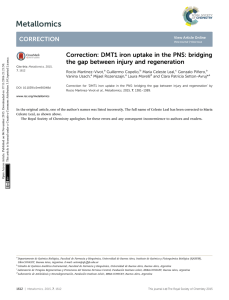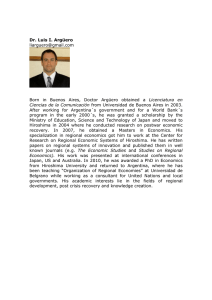CLE CIP Inglés - Ejemplos de ítems y tareas Comprensión Oral
Anuncio
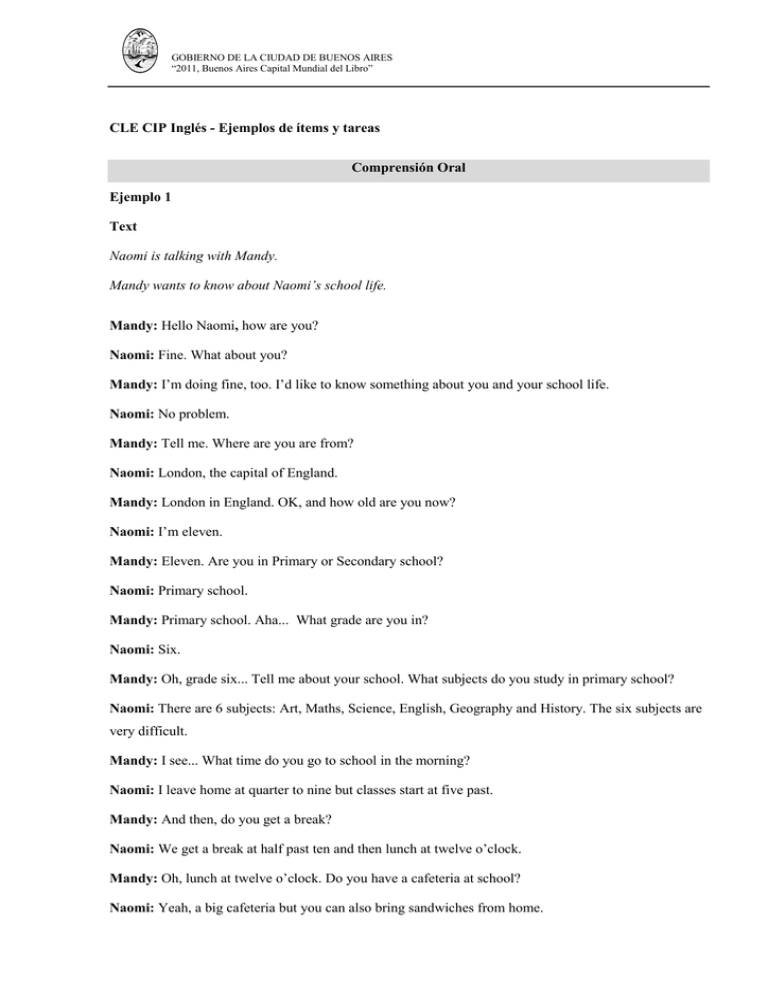
GOBIERNO DE LA CIUDAD DE BUENOS AIRES “2011, Buenos Aires Capital Mundial del Libro” CLE CIP Inglés - Ejemplos de ítems y tareas Comprensión Oral Ejemplo 1 Text Naomi is talking with Mandy. Mandy wants to know about Naomi’s school life. Mandy: Hello Naomi, how are you? Naomi: Fine. What about you? Mandy: I’m doing fine, too. I’d like to know something about you and your school life. Naomi: No problem. Mandy: Tell me. Where are you are from? Naomi: London, the capital of England. Mandy: London in England. OK, and how old are you now? Naomi: I’m eleven. Mandy: Eleven. Are you in Primary or Secondary school? Naomi: Primary school. Mandy: Primary school. Aha... What grade are you in? Naomi: Six. Mandy: Oh, grade six... Tell me about your school. What subjects do you study in primary school? Naomi: There are 6 subjects: Art, Maths, Science, English, Geography and History. The six subjects are very difficult. Mandy: I see... What time do you go to school in the morning? Naomi: I leave home at quarter to nine but classes start at five past. Mandy: And then, do you get a break? Naomi: We get a break at half past ten and then lunch at twelve o’clock. Mandy: Oh, lunch at twelve o’clock. Do you have a cafeteria at school? Naomi: Yeah, a big cafeteria but you can also bring sandwiches from home. GOBIERNO DE LA CIUDAD DE BUENOS AIRES “2011, Buenos Aires Capital Mundial del Libro” Mandy: And what do you do? Naomi: I normally bring sandwiches. I don´t like the food at school. Mandy: Why? Naomi: The food at school is horrible! I can´t eat that. Mandy: And tell me do they give you lots of homework? Naomi: No, not much. Sometimes, only one or two exercises. Mandy: Oh, that’s good to hear. So what’s your favourite subject? Naomi: Art. I love Art. I just like painting and drawing. Mandy: And then, what’s the subject that you find most boring? Naomi: Maths. Mandy: Maths? I also hate numbers!!! OK, Naomi. Good luck for secondary school next year! Naomi: Thank you. Next year is going to be difficult. Secondary school is very difficult. Task Listen and circle the correct option to complete the sentence. 1) At school Naomi studies... A. three subjects. B. six subjects. 2) Students stop classes for a break... A. before lunch. B. after lunch. 3) Naomi brings sandwiches from home because ... A. there isn´t a cafeteria at school. B. she doesn’t like food at school. GOBIERNO DE LA CIUDAD DE BUENOS AIRES “2011, Buenos Aires Capital Mundial del Libro” Ejemplo 2 TEXT You are going to listen to a radio interview. You have one minute to read task 2. (1 minuto de espera) Now listen to the recording and decide if the sentences are true or false. You will listen to the text twice. (5 segundos) Lucas: Good morning, dear listeners! This is Eco Radio. It is a wonderful day. It is sunny and warm outside. The good thing is: on sunny and warm days, you can wear your favourite jeans and a T-shirt full of colours! Today is “Green Day” and we have a visitor! Her name is Maria. She is a very young student. With her parents, Maria is working to help the earth. The questions today are: can we all help the earth? What exactly can we do to help the earth? Maria, welcome to our radio programme, “Kids helping their city!” Maria: Good morning, Lucas. I’m very happy to be here. Of course, we can help! There are a lot of things to do. We can all help the earth and our city a lot! Lucas: That’s good. First, we want to know about you. Where are you from? Tell us about your family. Maria: I’m from Misiones, Argentina. I was born in the city of Posadas but I came to Buenos Aires when I was 11, two years ago. In our home in Almagro we are five: my dad, mum and two brothers, and Pizza, my dog! Lucas: Your dog’s name is Pizza!!!(showing surprise) What an incredible name for a dog! And tell me, Maria: you get up around 7 in the morning every day, I suppose. What is the first thing you do to live in a clean city? Maria: Well, I don’t get up at seven. I get up at 6 o’clock. I clean my teeth every day and I’m very careful with the water I use. When I finish, I don’t leave the tap running. In this way, I save 30 litres of water every time I brush my teeth. Lucas: Thirty litres! Wow! That’s a lot of water! I am not careful with water. So let’s remember, dear listeners, don’t leave water running when you are not using it. Save water. What else do you do Maria? Maria: I go to school by bus or by bicycle. My father never takes me to school by car. Cars pollute the city. Buses also contaminate, but a bus transports lots of people at the same time. Lucas: So you always ride your bike or go to school by bus, good. Do you recycle paper, Maria? Maria: Yes, of course. I don’t throw away paper, I keep all the paper in enourmous bags. And my mother helps me a lot. She is a secretary and she works in an office. She takes all the paper from her office to the recycling centre. An office worker like my mother can recycle 90 kilos of paper per year. Lucas: Well, well.That is interesting... 90 kilos of paper every year. Oh dear, we must recycle! Maria: Yes, we can all help but we must do it now. Tomorrow can be late. Lucas: Maria, thank you for being here. You are a green girl because you care about our city and our earth. Maria is visiting the programme again on Thursday. So on Thursday you can phone and speak to Maria, our green friend. GOBIERNO DE LA CIUDAD DE BUENOS AIRES “2011, Buenos Aires Capital Mundial del Libro” Kids Helping their City Today is Green Day and Maria is visiting the programme Kids Helping their City. Have a look at the drawings below and then listen to the interview. Leave the tap running Recycle TASK Read these statements and tick ( ) T(rue) or F(alse) in the boxes below. T 1 This is a TV programme. 2 María lives in Misiones. 3 María saves 30 litres of water every day. F GOBIERNO DE LA CIUDAD DE BUENOS AIRES “2011, Buenos Aires Capital Mundial del Libro” Comprensión Lectora Ejemplo 1 Naomi wants to share this text with you. Gorillas are also her favourite animals! http://www.TheGorillaFoundation.org/index.php Welcome to The Gorilla Foundation's website made especially for kids! There is a lot of interesting information about gorillas here. THINGS YOU DON’T KNOW Gorillas are very big primates (the family of animals that also include monkeys and humans). An adult gorilla can be 6 feet tall (1.80 metres) and weigh 225 kg. They live in different countries in Africa. They are very similar to us. They have two legs and two arms, 10 fingers, 2 ears and 32 teeth. But they are different from humans because they have a lot of dark hair and they are very big. Gorillas can live between 50 and 60 years. Baby gorillas are very small and stay with their mothers for three years. After that, they usually stay with their families. They must learn how to find food and make sleeping nests. KOKO: A FANTASTIC GORILLA Gorillas are intelligent animals, but there is one that is special and famous. Her name is Koko and she is 37 years old. Koko lives at The Gorilla Foundation in California, USA. Why is she so famous? Because she can communicate with sign language and she is learning how to read. Penny, her teacher, and Koko play and work every day. Koko and Penny work hard At The Gorilla Foundation, we think that it is very important that children take an interest in animals, especially. You can write a letter to kids@koko.org to get more information about Koko’s life. GOBIERNO DE LA CIUDAD DE BUENOS AIRES “2011, Buenos Aires Capital Mundial del Libro” Task Read this text and circle the correct option 1) The text is from... A. a magazine. B. an internet site. C. a book about animals. 2) The word “primates” refers to... A. any group of animals. B. big gorillas. C. gorillas, monkeys and humans. 3) When gorillas are four years old... A. they live with all the family. B. they live with their mothers only. C. they live alone. 4) The Gorilla Foundation wants children... A. to write letters. B. to be interested in gorillas. C. to visit Koko. - Página - CLE CIP Inglés 6 GOBIERNO DE LA CIUDAD DE BUENOS AIRES “2011, Buenos Aires Capital Mundial del Libro” Ejemplo 2 The 7th grade students from Weston Primary School must choose a book from the library and write about it. Here is what Leticia and Adam wrote. Read. Alice in Wonderland By Lewis Carroll Leticia Row, 7th grade Alice is walking in the garden. She sees a rabbit in a red coat and grey trousers running very fast from plant to plant. She follows the rabbit. The rabbit jumps into a hole in the garden. Alice jumps into the hole too, and she falls and falls and falls... She falls 100 metres down! The hole is very, very deep! At the bottom of this hole, there is a room with a lot of doors. One door is very small. The others are big. All the doors are locked. Alice finds a key on a table. It is the key to the little door and it works all right! The door is open now! But Alice can´t go in because she is too tall... Holes By Louis Sachar Adam Jenkins, 7th grade “Holes” is the story of a boy called Stanley Yelnats. Years ago, they took Stanley to a camp prison – a special prison where criminals work - but he wasn´t a criminal. In this camp, Stanley must make a deep hole in the ground every day. The holes Stanley makes must be 70 metres deep! The weather is very dry and hot. He is always very tired and his days in the camp are horrible. One morning, in his hole, he finds something very important for the camp director... and Stanley´s life changes from this moment on. Finally, he escapes from the prison with Zero, Stanley´s only friend in the prison ... - Página - CLE CIP Inglés 7 GOBIERNO DE LA CIUDAD DE BUENOS AIRES “2011, Buenos Aires Capital Mundial del Libro” Task Read these statements and tick ( ) T(rue) or F(alse) in the boxes below. Alice in Wonderland T F T F 1. Leticia wrote the book “Alice in Wonderland”. 2. The rabbit is wearing some clothes. 3. All the doors in the room are very small. 4. Alice can open the little door. Holes 5. “Holes” is about a boy in a prison. 6. Stanley is innocent. - Página - CLE CIP Inglés 8 GOBIERNO DE LA CIUDAD DE BUENOS AIRES “2011, Buenos Aires Capital Mundial del Libro” Reconocimiento del Sistema Lingüístico Ejemplo 1 Christmas Day in Argentina Naomi is planning to spend Christmas in Argentina this year. She needs to know how we celebrate here! Read this text and circle the correct option On December 25th, many people in Argentina celebrate Christmas Day. It is a very important Christian celebration in our country. People aren’t / don’t (1) go to work that day but / because (2) it is a holiday. On this day, people do different activities. They have / are having (3) lunch with their families or go to church. During this time, they / there (4) are various decorations in the streets, and the shops have got / has got (5) lots of presents to buy for family and friends. Children like writing / write (6) letters to Santa Claus to ask for toys- - Página - CLE CIP Inglés 9 GOBIERNO DE LA CIUDAD DE BUENOS AIRES “2011, Buenos Aires Capital Mundial del Libro” Ejemplo 2 SPIDERS Are you afraid of spiders? They can be very interesting. Read this text and circle the correct answer. - Página - CLE CIP Inglés 10 GOBIERNO DE LA CIUDAD DE BUENOS AIRES “2011, Buenos Aires Capital Mundial del Libro” Producción Escrita TAREA 1: Respuesta breve a preguntas contextualizadas. You are reading a website for students. You want to be a member. - Página - CLE CIP Inglés 11 GOBIERNO DE LA CIUDAD DE BUENOS AIRES “2011, Buenos Aires Capital Mundial del Libro” TAREA 2: Producción de texto a partir de guía. In The Students Website there is a very interesting blog: Teens Write. You want to participate. - Página - CLE CIP Inglés 12 GOBIERNO DE LA CIUDAD DE BUENOS AIRES “2011, Buenos Aires Capital Mundial del Libro” Clave de Respuesta Comprensión Oral: Ejemplo 1: - Text: Naomi’s School Life. Task: 1) B 2) A 3) B Ejemplo 2: - Text: Kids Helping the City. Task: 1. False 2. False 3. True Comprensión Lectora: Ejemplo 1: - Text: Gorillas. Task: 1) B 3) A 2) C 4) B - Text: Summaries-Alice in Wonderland and Holes. - Página - CLE CIP Inglés 13 GOBIERNO DE LA CIUDAD DE BUENOS AIRES “2011, Buenos Aires Capital Mundial del Libro” Task: 1. False 4. True 2. True 5. True 3. False 6. True Reconocimiento del Sistema Lingüístico Ejemplo 1: - Text and Task: Christmas. 1) aren’t 4) there 2) because 5) have got 3) have 6) writing Ejemplo 2: - Text and Task: Tarantulas. 1. live 2. Their 3. eating 4. Don’t 5. At 6. have got 7. can 8. These 9. because 10. saw - Página - CLE CIP Inglés 14 GOBIERNO DE LA CIUDAD DE BUENOS AIRES “2011, Buenos Aires Capital Mundial del Libro” Producción Escrita TASK 1: Questionnaire for Students Website. Sample of MAP: 1- I usually watch TV / watch a film / read books... 2- I like Geography / History... 3- I go to the park / to the cinema / to the club... 4- I went to the football stadium/ I stayed at home.... 5- Yes, I do/ I like it/ using the computer/it because it’s fun/ it’s interesting… No, I don’t/ like it/ using the computer/it because it’s difficult… TASK 2: Teens Write: Your Favourite Place at School. Sample of MAP: My favourite place is the library. It´s big / nice. It´s got (yellow) walls (and) (a lot of) desks / tables / chairs ...There are a lot of books ... Students can read (adventure / science) books there... I like it because it´s new / beautiful / comfortable / there are a lot of posters on the walls / I can read / learn/ investigate there ...I go to / visit (the library / it) every Friday / in the morning... / at 10 am...In the library students must be quiet / silent / can´t talk. Yesterday I read a book... Producción oral - Tarea 2: Encontrar y Describir 4 Diferencias. Ejemplo 1: Look at these pictures. They show two brothers in their bedroom. Find 4 differences. For example (pointing): In this picture, this boy is reading a book, but in this picture, he’s reading a comic. - Página - CLE CIP Inglés 15 GOBIERNO DE LA CIUDAD DE BUENOS AIRES “2011, Buenos Aires Capital Mundial del Libro” Sample answers: This boy is playing with the computer. This boy is writing. It’s a sunny day. It’s raining. Ejemplo 2: Look at these pictures. They show a jungle. Find 4 differences. For example (pointing): In this picture, the monkey is eating a banana. In this picture, the monkey is eating an apple. Sample answers: The monkey is grey. I can see / There are 2 trees. This monkey is brown. I can see / There are 4 trees. -Tarea 3: Narrar una Secuencia de Eventos. - Página - CLE CIP Inglés 16 GOBIERNO DE LA CIUDAD DE BUENOS AIRES “2011, Buenos Aires Capital Mundial del Libro” Ejemplo 1: Story: At School. 1. This is Bob’s day at school. It’s 8 o’clock. He is walking into school. Now you continue the story (pointing at the other pictures). 2. Bob is in the classroom. He is writing 3. Bob is having lunch. He is eating chicken/salad. Bob is in the (school) playground/yard/gym class. He is tired. 4. . - Página - CLE CIP Inglés 17 GOBIERNO DE LA CIUDAD DE BUENOS AIRES “2011, Buenos Aires Capital Mundial del Libro” Ejemplo 2 Story: The Family Dog. Look at these pictures. They tell a story. This is Skip, the Brown’s dog. Every morning, Skip goes shopping with Mrs Brown. Look, in this picture, he is walking with her. Now, tell me what Skip and the family usually do every day. Sample answers to describe picture 2: Skip is in the kitchen with Mrs. Brown. Skip and Mrs.Brown are in the kitchen. Skip Mrs. Brown eats / is eating / has / is having lunch. Skip and Mrs.Brown eat / are eating / have / are having lunch. Mrs. Brown watches / is watching TV. - Página - CLE CIP Inglés 18
